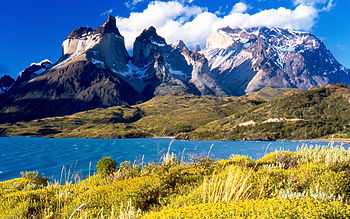Chiloé Block
| Geology of the Andes |
|---|
 |
| Orogenies |
| Pampean orogeny |
| Famatinian orogeny |
| Gondwanide orogeny |
| Andean orogeny |
| Fold-thrust belts |
|
Central Andean | Patagonian |
| Batholiths |
| Peruvian Coastal | North Patagonian | South Patagonian |
| Subducted structures |
|
Antarctic Plate | Carnegie Ridge | Chile Rise | Farallon Plate (formerly) | Juan Fernández Ridge | Nazca Plate | Nazca Ridge |
| Faults |
|
Gastre | Liquiñe-Ofqui | Magallanes-Fagnano |
| Andean Volcanic Belt |
|
Northern Zone| Peruvian flat-slab | Central Zone | Pampean flat-slab | Southern Zone | Patagonian Gap | Austral Zone |
| Paleogeographic terminology |
|
Arequipa-Antofalla Terrane | Chilenia | Chiloé Block | Cuyania | Iapetus Ocean | Madre de Dios Terrane | Mejillonia | Pampia |
| |
The Chiloé Block or Chiloé Terrane is a geotectonic unit making up the basement of large parts of south-central Chile between 41° and 45°S. Due to its form it is sometimes called Chiloé Sliver. The Chiloé Block is believed to be an ancient microcontinent or terrane that collided with the South American Plate during the Proterozoic. The Chiloé Sliver is however badly sutured to South America as the Liquiñe-Ofqui Fault runs through its eastern boundary.